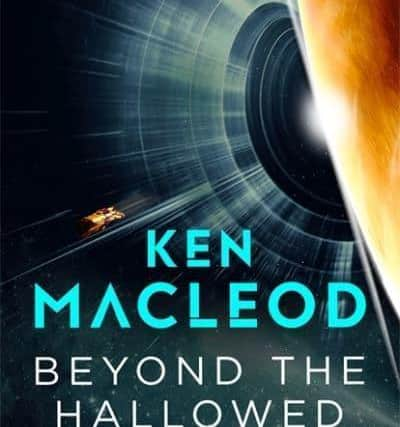Book review: Beyond The Hallowed Sky, by Ken MacLeod


If you like science fiction, you will love this. If you think “science fiction is not for me” then you should read this. Polonius in Hamlet describes the players as “the best actors in the world, either for tragedy, comedy, history, pastoral, pastoral-comical, historical-pastoral, scene indivisible, or poem unlimited”. MacLeod’s new book might well be a geopolitical-metaphysical-thriller. For those still sceptical, it is a rollicking good read with elements of Ian Fleming and Stanislaw Lem. It is breakneck both in terms of pace and in ideas.
Spoiler alert: this is the first part of a trilogy. I blame JRR Tolkien for the slow-drip version of narrative. So, it isn’t a surprise that the opening quandary is not going to be revealed in Beyond The Hallowed Sky. Said initial hitch is both simple and deeply complicated. Lakshmi Novak is a graduate student, in 2067, who receives a letter. The first odd thing about this letter is that it is a letter; moreover it is on air-mail paper, sent from Kabul from British Forces Posted Overseas. In an age with email and glasses that interface with reality, this is already disconcerting. Furthermore, the letter is in her own handwriting and postulates equations for a way to travel faster than light. One possible interpretation of the mysterious epistle is that in the future, Lakshimi has created the equation and used it to travel back in time to tell herself the equation; the so-called boot-strap paradox.
Advertisement
Hide AdIn the world of the novel there are three dominant powers. There is the Alliance (basically the anglophone world), the Union (comprising the Celtic Fringe and Europe) and the enigmatic Co-Ord of Russia and China. Lakshmi’s revelation of the equation makes her defect from Alliance to Union. MacLeod’s humour is typically sardonic when she crosses the border and hears “Welcome tae Scotland! Welcome tae the Union! Welcome tae freedom!”


Lakshmi, on the way, has met a cryptic and sinister individual, Owen, who again is lined with irony. He is a cultural attaché for the British Council, and everyone knows what that really means. In Scotland, there is an engineer working on submarines on the Clyde, John Grant, who is watching strange submarines lifting off in a bubble from the Alliance site at Faslane. The Union is socialist – with slogans like “Seize opportunity, grasp possibility”, “All pessimism is unfounded” and “Seek truth from facts”.
Elsewhere, Emma Hazeldene is exploring a planet where there are rocks don’t behave like rocks. Hazeldene is interested in the fact that there is life in the universe – MacLeod has a nice turn of phrase in describing the “boids” in the sky of the planet Apis and suchlike – but the real question is the Fermi Paradox: if there are intelligent aliens, why aren’t they in touch? That Hazeldene and her team has travelled beyond the solar system is a niggle that resolves deftly. Also, there is a great pun, in that Apis means “bee” in Attic Greek and there are, unexpectedly, bees on the planet: they have found Planet B. They have also found a combination of Tetris and the balls from The Prisoner who are communicating. What they say is basically “go away”.
This quadrille of narratives does converge, although, expectedly, with a cliff-hanger for the next book. Nonetheless, the sheer verve of the book is sufficient unto itself – and who can’t admire a book where one character says “You’re telling me you’re not publishing because you might be committing plagiarism via time travel?” The novel deals with separatism, superpower hegemony, refugees and asylum seekers, ecological catastrophe (some of the young have placards with “THE SEA IS RISING AND SO ARE WE”), venal and lazy politicians and planets that look bizarrely like Scotland.
MacLeod plays his cards close to his chest. There are certain references, such as to Faraday Cages, a Guth Spindle or a Cherenkov flash, that will have some readers scrambling for Wikipedia. MacLeod has a fearful track record in terms of writing speculative fiction that uneasily turns out to be true (religious terrorism, illiberal liberalism, resurgent Soviet dominance, deep fakes and fake news). He is the contemporary Samuel or Isaiah of Scottish writing. Half of his work says “I would not do that if I were you” and half says “I told you so”.
That said, the end of the book, with rag-tag crew, compassion and a poke in the eye to the boss reminded me of the genuine optimism of the very first Star Trek episodes. MacLeod’s work has always been more political than most science fiction; in some ways because he is interested in ideas rather than how many tentacles something has. I cannot wait to see where the Clyde-built interstellar ship takes us next.
Advertisement
Hide AdBook review: Beyond The Hallowed Sky, by Ken MacLeod, Orbit, £8.99
A message from the Editor:
Thank you for reading this article. We're more reliant on your support than ever as the shift in consumer habits brought about by coronavirus impacts our advertisers.
If you haven't already, please consider supporting our trusted, fact-checked journalism by taking out a digital subscription at https://www.scotsman.com/subscriptions